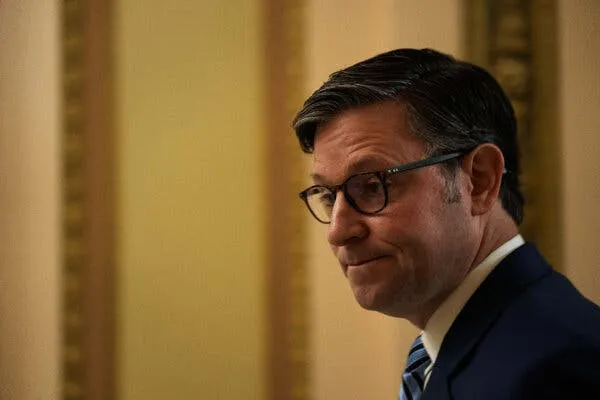Mike Johnson and the Medicaid Dilemma
House Speaker Mike Johnson has recently taken center stage in the ongoing discourse surrounding Medicaid funding and healthcare reform in the United States. As fiscal hawks within the Republican Party push for aggressive cost-cutting measures and budget efficiencies, moderates have rallied to protect the essential healthcare program that serves millions of Americans. Johnson’s cautious approach aims to placate both sides, but whether it can be sustained remains uncertain.
The Divided Republican Landscape
The Republican Party is grappling with a fundamental division—a rift that has grown deeper as fiscal realities confront the ambitions of its more moderate members. With Johnson at the helm, moderates are currently finding themselves on the winning side of the argument regarding Medicaid, successfully advocating against cuts that could leave millions without critical support.
The moderates argue that Medicaid is not just a social safety net but an essential component of the economy, allowing lower-income families access to healthcare, thus preventing them from sinking further into poverty. As these members press their case, they then face pressure from fiscal hawks—Republicans who see government spending as an existential threat to the nation’s financial future.
Johnson’s Balancing Act
Speaker Johnson has ruled out any aggressive plan to cut Medicaid funding. Instead, he has suggested a more tempered approach, emphasizing that any necessary reforms should not threaten the existing beneficiaries. Johnson’s commitment seems to echo the sentiments of moderates: a recognition that while fiscal prudence is essential, drastic cuts could have dire consequences for those reliant on these services.
“We must find a way to maintain fiscal responsibility while ensuring that we are not leaving vulnerable populations behind,” Johnson stated, indicating his intent to strike a balance amidst a tense political environment. He has called for policies that will not add to the deficit — a point that resonates deeply with fiscal hawks within his party.
The Fiscal Hawk’s Perspective
Fiscal hawks have long argued that entitlements like Medicaid contribute significantly to the national debt, thus necessitating reform or cuts. They are adamant that the government cannot continue to shoulder such expenses, particularly in an age of rising interest rates and inflation. Their argument revolves around the idea that failure to address these issues now will pass on an untenable burden to future generations.
In a recent harsh critique, GOP representative and longtime fiscal hawk Steve Scalise noted, “Our nation is on an unsustainable fiscal path. We need to make hard decisions now, or we will pay – and our children will pay – the price later.” Scalise’s concerns underline a significant worry within his faction of the party that if the government continues to operate at a deficit, it endangers the financial future of the country.
The Fight for Healthcare Access
However, moderates argue passionately against the cuts, contending that they would be cruel and counterproductive. With a prolonged economic recession appearing on the horizon, they highlight that cutting Medicaid programs would strip necessary healthcare services from millions—leading not to a reduction in spending, but to higher costs elsewhere, such as in emergency rooms that will still have to provide care regardless of insurance status.
Representative Cheri Bustos, a moderate voice within the party, emphasizes the economic implications of cutting Medicaid: “Medicaid is a lifeline. It supports not just health but workforce participation. We need to maintain these programs if we truly care about the prosperity of our communities.”
Long-term Solutions versus Short-term Cuts
The current debate seems to hinge not just on Medicaid, but on the larger issue of how the Republican Party envisions its future in regard to entitlements and welfare programs. The clash between fiscal hawks and moderates signals a deeper ideological battle over the role of government and social responsibility.
Johnson has positioned himself as a middle-path navigator, although the practicalities of maintaining that position during contentious legislative sessions are unclear. As moderates urge cautious reforms with a focus on maintaining benefits, fiscal conservatives push for immediate reductions that could reshape healthcare across states.
The Implications for Future Legislation
With Johnson’s moderate stance, the likelihood of any draconian cuts being implemented seems slim for now. However, the continued friction within the party raises concerns about the feasibility of achieving any healthcare reforms, particularly any comprehensive reform of Medicaid that could satisfy both factions. Historical instances in Congress show that when factions become too entrenched in their viewpoints, the result can be legislative gridlock, denying progress in critical areas like healthcare.
As the debate around Medicaid funding progresses, it will be essential for Johnson to maintain open lines of communication among party factions, understanding both the urgency for fiscal responsibility and the ethical ramifications of healthcare cuts. In doing so, he might discover a path to not only preserving Medicaid but also addressing the more significant systemic issues within American healthcare.
The Road Ahead
As lawmakers engage in this significant battle over Medicaid, the eyes of the nation will be on Congress. The discussions to come in the following weeks will shape the future of healthcare for millions, define the contours of GOP policymaking, and impact voters’ perceptions of their representatives.
With a substantial portion of Americans relying on Medicaid as their primary form of health coverage, any changes implemented will have a palpable impact. The decision-makers must weigh the value of economic reform against the social responsibilities of government—a complicated balancing act, but crucial for ensuring that every American has access to necessary health services.
The implications are broad-ranging, potentially influencing political dynamics heading into the next election cycle, as well as affecting public sentiment regarding the sustainability and efficacy of governmental programs. For now, speaker Mike Johnson will need to navigate these choppy waters and ensure that both sides feel heard while pushing for policies that can find common ground—a feat easier said than done.







